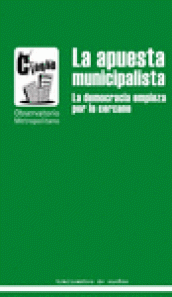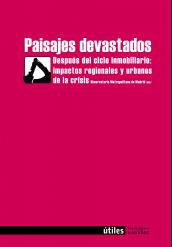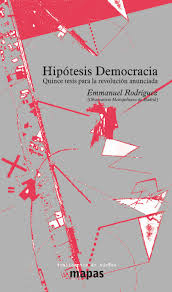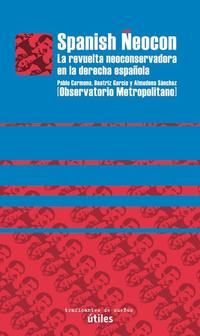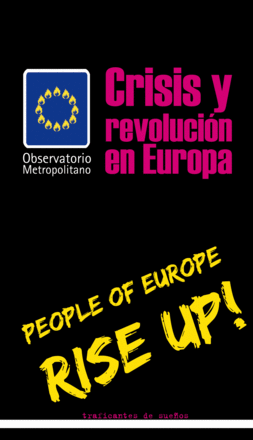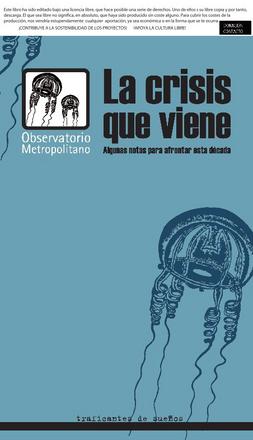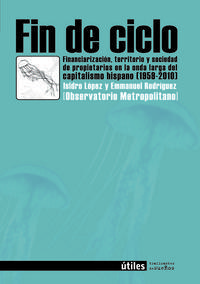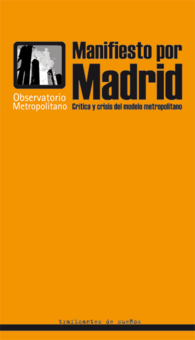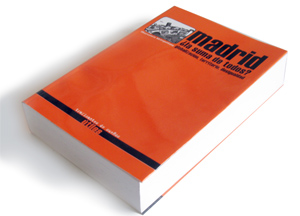Artículo de Nick Mirzoeff sobre una presentación del OM en Occupy WS: Militant Research–Madrid
jueves, abril 19th, 2012It is one thing to call for activist research, it’s altogether something else to carry it out. There are a number of interesting existing models. They seem to have in common a willingness to work outside the formal structures of the university, to work on projects, rather than within disciplines, and to publish their work freely and open source on and offline.
One example is the Madrid collective Observatorio Metropolitano [OM from now on]. Their work was presented last night at 16 Beaver by Ana Méndez de Andés, an architect and urban planner who teaches Urban Design at the Universidad Europea de Madrid. In the announcement for the event, OM were described as:
a militant research group that utilizes investigations and counter-mapping to look into the metropolitan processes of precarious workers, migrants, and militants taking place in Madrid, brought on by crisis, gentrification, speculation and displacement.
In her presentation, Méndez de Andés described how the group had come together in 2007 at the height of the speculative building boom in Madrid to try and discover exactly what was happening in the city. With disarming wit, she commented that it was an advantage that Madrid was seen as a provincial city, lacking the cosmopolitan identity of Barcelona, because it was easier to examine the city’s changes.
The group was intellectual but not academic, interested in carrying out what she called “militant research,” which she distinguished from activism. In their Manifesto for Madrid, OM define this as being [these are my no doubt dreadful translations: do consult the originals before quoting!] :
Militant investigations which will bring the knowledge and policy tools necessary to address these enormous processes of change. To build a communication space between members, technicians and stakeholders, and above all between small projects (or embryonic projects) of militant research already occurring in the city and the social movements.
Méndez de Andés joked that she herself was not very good at organizing events, so she had stuck to analysis. Their research generates both substantial books, 400 pages long, and short, accessible pamphlet-length works available free as PDFs. The Manifesto strikes the signature note for OM projects in its denunciation of
the destruction of the elementary bases, which make possible common life (la vida en común) in a city like Madrid.
Written at the height of the boom, the Manifesto was able to visualize the transformation of Madrid into a global city at the expense of the creation of a marginalized class of people living precariously, the undermining of social provisions for health, environment and education and (as we all now know) spectacular debt.
The related open-source copyleft publishing venture, Traficantes de Sueños does not define itself as a publisher:
It is, however, a project, in the sense of ‘commitment’, which aims to map the constituent lines of other forms of life.
Central to this venture is “freedom of access to knowledge.” All publications are available either as downloads or as books. Some people buy all the books as a means of supporting the project, regardless of whether they intend to read them. Publications are generated rapidly so that they can contribute to the ongoing discussion and debate within the social movements, rather than reflect on them later (I was recently asked by contrast to contribute to a collection on OWS, bearing in mind, as the call put it, that Zuccotti Park will be ancient history by the time of publication).
In La crisis que viene (The Coming Crisis) [March, 2011] OM see the the financial crisis as a prelude to the unrelenting privatization of the commons across Europe. For OM, there is:
a constant underlying all measures: interest and financial benefits go first. Although this will cost the immediate and future welfare of entire populations. Although this will involve the dismantling of pension systems and the decline of social rights acquired over decades. Although such policies will cause the whole economy to slide, limping along the path of stagnation. The next decade offers us no more than a new round of privatization of services and social guarantees, a greater decline in wages, and a social crisis which is still known only in its embryonic stage.
By October 2011, this pessimism was offset by the possibilities of the new social movements across Europe. Crisis and Revolution in Europe argues that, to quote the poet Holderlin,
“there grows what also saves.” The antidote has been accompanied by citizens’ movements now extend across most of the continent. This is the 15M, the movement of Greek squares, the French strikers and the indignados in a growing number of countries. It is in this work in progress of political reinvention, where you can find a social outlet to the crisis, in addition to rescuing that which really matters: democracy and European society.
Their analysis is now being translated into Portuguese, English, Greek and Italian in order to create a transEuropean dialogue about the crisis and build towards transEuropean social movements, perhaps even strikes.
No-one yesterday asked the quintessential Anglo question about funding. I took it that there the project was sustained by a mix of commitment, donation and the blanket subscriptions.
While there are many nascent publishing ventures using online and low-cost publishing in the Anglophone world, I don’t think we have anything to quite match this: though I would love to be corrected! Too many of the new digital publishing ventures spend so much time accommodating the demands of tenure, the one per cent of academia, that the online virtues of speed and accessibility get lost. Too much of the Occupy research is about the vicissitudes of Occupy and not the collective issues that brought us into the movement.
That said, where the Spanish have led the way before, we have also followed from the “Take the Square” movement to Occupy Wall Street. Of those who are still reading at this point, I bet many of us are intellectuals of one sort or another. How about it? A collective militant/activist research project(s)?
Autoría: Nick Mirzoeff
Fuente: http://www.nicholasmirzoeff.com

